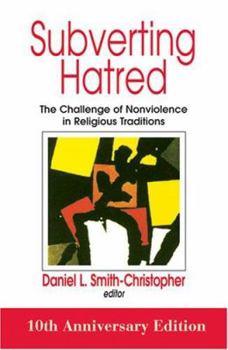Subverting Hatred: The Challenge of Nonviolence in Religious Traditions
(Part of the Faith Meets Faith Series)
Select Format
Select Condition 
Book Overview
In the spring of 1998, the Boston Research Center for the 21st Century commissioned this series of essays to investigate the theme of nonviolence in the sacred texts, the oral teachings, and the traditions of major world religions. Subverting Hatred: The Challenge of Nonviolence in Religious Traditions sheds light on the mixed messages and conflicting testimony that emerged from this study and underscores the central questions for religious individuals...
Format:Paperback
Language:English
ISBN:157075747X
ISBN13:9781570757471
Release Date:September 2007
Publisher:Orbis Books
Length:238 Pages
Weight:0.65 lbs.
Dimensions:0.5" x 5.4" x 8.2"
Customer Reviews
2 ratings
Excellent Primer on Religion and Peace
Published by Thriftbooks.com User , 17 years ago
Each essay in this collection offers tenable prescriptions for subverting hatred and eliminating expressions of violence that percolate upward from what editor Daniel L. Smith-Christopher calls the "religious impulse of humanity." The Jainist plea for peace, the Buddhist peace wheel, the Confucian/Daoist teachings that "channel conflict" and "call for cooperation," the Hindu teaching of ahimsa (non-harm), and what Quaker Smith-Christopher labels Christian "political atheism" (in imitation of the early Christians' relationship with the Roman Empire) and "radical faith" (a faith that challenges nationalism, patriotism and cults of violence), as well as Islam's al-jihad al-akbar (the Greater Struggle) all offer a religious means of achieving a peaceful, non-violent world.
Threads of non-violence
Published by Thriftbooks.com User , 18 years ago
The Qu'ran is full of violence. So say some. Others say that Islam, as the youngest of the three religions of the book, reflects an immaturity about violence that we should discount as just an early phase of Muslim ethics. Of course, the immediate retort might be that the Hebrew Scriptures (Old Testament) are full of violence. Passages like Amos 1 (hurling fire against Gaza is good!)perplex me. Since then I am glad to read that there are Jews who respond similarly to me to the violent passages in their Scriptures (which are our Scriptures too). Their response is more than embarrassment. The Rabbis call it "desecration of the Name (of God)". "Subverting Hatred: The challenge of Nonviolence", edited by Daniel L. Smith-Christopher is helping me process these matters in the shadow of the dark events in Palestine/Israel and southern Lebanon. Islamists do justify violence out of the Qu'ran. The Hezbollah are ultimately intent on wiping out all non-Muslims and setting up a shariah empire. Jews justify violence out of their Scriptures. Christians too have looked to their Old Testament to back up the Crusades, the two European wars against Germany in 1914-1918 and 1939-1945. Indeed, from the time of Constantine from AD 312, Christians have developed mainstream justifications of war, violence and aggression in the "Just War" theory. "Subverting Hatred" does not deny the paradigms for violence in our Scriptures. They are there to see in Qu'ran and Old Testament. But what is also true is that in Islam, Judaism and Christianity there has always been a tradition of non-violence, often a minority voice, often shouted down, but still articulate. Read the verses in the Qu'ran that urge Muslims to protect other believers of the Book, that is, Christians and Jews. The Qu'ran became the basis of harmonious multi-faith societies in mediaeval Sicily, Spain and elsewhere. Witness "the pacifist Cistercian abbot Isaac of Étoile" in his condemnation of the crusades... "thunder against the formation of the formation of military `Orders' calling them a monstrum novum, a `new monstrosity'. (p. 156) Witness George Fox, founder of the Quakers, declaring that the covenant of peace was "before all wars and strife". (p. 159). Witness modern Quaker Leonard Friedrich sent to Buchenwald for his denunciation of the Nazis and his "Jew-friendly pacificism". (p. 159) So there is hope for non-violence sponsored by the religious traditions. Those who advocate non-violence challenge the religious traditions to draw on these peaceful traditions in our contemporary self-definition. There is a thread of non-violence and protection of human life in the Qu'ran. There is a strong theme of non-violence and hammering weapons into ploughshares (Isaiah 2) in the Scriptures of the Jews and Christians. There are explicit exhortations to non-violence in the New Testament. The essays in "Subverting Hatred" invite us to cling to these threads and condemn the violence both of Islamis






